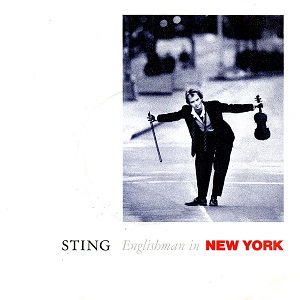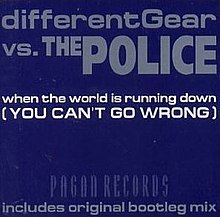
The Police were an English rock band formed in London in 1977. For most of their history the line-up consisted of primary songwriter Sting, Andy Summers (guitar) and Stewart Copeland. The Police became globally popular in the late 1970s and early 1980s. Emerging in the British new wave scene, they played a style of rock influenced by punk, reggae, and jazz.

Reggatta de Blanc is the second studio album by British rock band the Police, released on 2 October 1979 by A&M Records. It was the band's first release to top the UK Albums Chart and features their first two UK number-one singles: "Message in a Bottle" and "Walking on the Moon". In early 1980, the album was reissued in the United States on two 10" discs, one album side per disc, and as a collector's edition with a poster of the band.

Zenyatta Mondatta is the third studio album by English rock band the Police, released on 3 October 1980 by A&M Records. It was co-produced by the band and Nigel Gray.

"Don't Stand So Close to Me" is a hit song by the rock band the Police, released in September 1980 as the lead single from their third album Zenyatta Mondatta. It concerns a teacher who has a sexual relationship with a student, which in turn is discovered.

"Englishman in New York" is a song by English singer-songwriter Sting, from his second studio album ...Nothing Like the Sun, released in October 1987. Branford Marsalis played soprano saxophone on the track, while the drums were played by Manu Katché and the percussion by Mino Cinélu.

Bring On the Night is the first live album by Sting recorded over the course of several live shows in 1985 and released in 1986. The title is taken from a song by the Police from their 1979 album Reggatta de Blanc. The songs performed include Sting's early solo material from the studio album The Dream of the Blue Turtles, and from his time with The Police, with a few of the performances played as medleys of the two. The touring band features the prominent jazz musicians Branford Marsalis on saxophone and clarinet, Darryl Jones on bass guitar, Kenny Kirkland on keyboards and synthesizer, and Omar Hakim on drums. Also appearing are backing vocalists Janice Pendarvis and Dolette McDonald.

"Message in a Bottle" is a song by English rock band the Police. It was released as the lead single from their second studio album, Reggatta de Blanc (1979). Written by the band's lead singer and bassist Sting, the song is ostensibly about a story of a castaway on an island, who sends out a message in a bottle to seek love. A year later, he has not received any sort of response, and despairs, thinking he is destined to be alone. The next day, he sees "a hundred billion bottles" on the shore, finding out that there are more people like him out there. Over the course of the song, Sting mentions sending an S.O.S. 31 times.

The Very Best of... Sting & The Police is a compilation album issued by A&M Records on November 17, 1997, containing a mix of Police songs and Sting's solo works. It originally featured one new track, a remix of the 1978 song "Roxanne" by rap artist Sean "Puffy" Combs. The album was reissued in 1998 by PolyGram International with "Russians" removed and three added tracks: "Seven Days", "Fragile", and "De Do Do Do, De Da Da Da".

"The Bed's Too Big Without You" is a song by English rock band the Police, released as the final single from their second studio album Reggatta de Blanc (1979). It was written by lead vocalist and bassist Sting. An alternate version was released as a single in the UK in 1980 in the set Six Pack in conjunction with the re-release of the Police's earlier singles "Roxanne", "Can't Stand Losing You", "So Lonely", "Message in a Bottle" and "Walking on the Moon".

"Spirits in the Material World" is a song by rock trio the Police, written by Sting. It is the opening track for their 1981 album Ghost in the Machine. It was released as a single in 1981 and reached No. 12 in the United Kingdom and No. 11 in the US in early 1982.

"So Lonely" is a song by English rock band the Police, released as the third and final single in November 1978 from their debut studio album Outlandos d'Amour (1978), and again in February 1980 as a re-release. The song uses a reggae style, and featured Sting on lead vocals.

"De Do Do Do, De Da Da Da" is a song by the Police, released as a single on 20 November 1980. Released as the British second single from the album Zenyatta Mondatta, the song was written by Sting as a comment on how people love simple-sounding songs. The song was re-recorded in 1986 as "De Do Do Do, De Da Da Da '86" but not released until 1995.

The Police is a self-titled compilation album released by the Police on 5 June 2007, to both celebrate the 30th anniversary of their recording debut and accompany their reunion tour. It contains 28 tracks over two discs, a mixture of hit singles and fan favourites. All the singles are included, with the exception of "Secret Journey" and '"Don't Stand So Close to Me '86". International editions contain two bonus tracks, "The Bed's Too Big Without You" from Reggatta de Blanc and "Rehumanize Yourself" from Ghost in the Machine. The band's non-studio album debut single, "Fall Out", originally recorded in 1977, is also included; other than Message in a Box: The Complete Recordings (1993) the song has never been included on any other Police album.
"Behind My Camel" is the eighth track from the 1980 album Zenyatta Mondatta by the British rock band The Police. The song was written by guitarist Andy Summers and was the first one to be composed solely by him during his career in The Police. It won the Grammy Award of 1982 for the Best Rock Instrumental Performance.
"Reggatta de Blanc" is a 1979 musical composition by The Police, and the title track on their second album. The instrumental evolved from improvisational stage jams during early Police performances of the song "Can't Stand Losing You". The track won the Grammy Award for Best Rock Instrumental Performance in 1980.

Certifiable: Live in Buenos Aires is a live album and concert video by the Police. It was recorded in December 2007 during the band's reunion tour and was released in November 2008. The album was released in the US exclusively through Best Buy. The album has a number of releases including a four disc version containing two CDs and two DVDs. The two CDs contain the live album from River Plate Stadium in Buenos Aires, Argentina. The first DVD contains the 109-minute wide-screen concert presented in Dolby Surround and Stereo. The concert film was directed and produced by Jim Gable and Ann Kim, of Graying & Balding, Inc. The second DVD contains the 50-minute bonus feature, "Better Than Therapy," directed by Stewart Copeland's son Jordan Copeland, detailing The Police's reunion with behind-the-scenes interviews from the band and road crew, plus two photo galleries of The Police on tour: one shot by guitarist and photographer Andy Summers, and one by photographer Danny Clinch. The DVDs were also released on Blu-ray format. A triple vinyl format was also released that contained a digital download of the concert.

The English rock band the Police has released five studio albums, three live albums, seven compilation albums, 10 video albums, four soundtrack albums and 26 singles. The Police sold over 75 million records worldwide.
Nigel Gray was an English record producer. His album credits include Outlandos d'Amour (1978), Reggatta de Blanc (1979), and Zenyatta Mondatta (1980) for the Police, Kaleidoscope (1980) and Juju (1981) for Siouxsie and the Banshees, as well as five albums for Godley & Creme.
"Driven to Tears" is a song written by Sting and first released by The Police on their 1980 album Zenyatta Mondatta. Although not released as a single, the song reached #35 on the Billboard Mainstream Rock Tracks chart. The political overtones of the song represent the beginning of the political activism that would recur throughout much of Sting's and the Police's subsequent music. On classic rock radio stations, the song is usually followed immediately by “When the World Is Running Down, You Make the Best of What's Still Around”.

"Bring on the Night" is a song by British rock band the Police. Written by the band's bassist and vocalist Sting, the song appeared as the fourth track on the band's second studio album, Reggatta de Blanc (1979).














